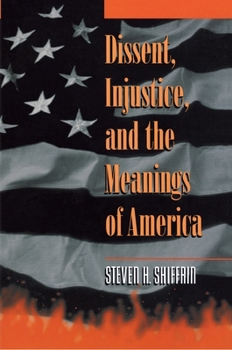Dissent, Injustice, and the Meanings of America
Select Format
Select Condition 
Book Overview
Americans should not just tolerate dissent. They should encourage it. In this provocative and wide-ranging book, Steven Shiffrin makes this case by arguing that dissent should be promoted because it lies at the heart of a core American value: free speech. He contends, however, that the country's major institutions--including the Supreme Court and the mass media--wrongly limit dissent. And he reflects on how society and the law should change to encourage...
Format:Hardcover
Language:English
ISBN:0691001421
ISBN13:9780691001425
Release Date:December 1998
Publisher:Princeton University Press
Length:220 Pages
Weight:1.10 lbs.
Dimensions:0.7" x 6.0" x 9.0"
Customer Reviews
2 ratings
A powerful argument from a distinguished scholar and teacher
Published by Thriftbooks.com User , 24 years ago
Steve Shiffrin is one of the most important thinkers writing on First Amendment issues today. He has long held the view that the point of the First Amendment's guarantee of free speech is to protect dissent. Shiffrin's dissent-based view constrasts both with libertarian defenses of freedom of speech and the familiar metaphor of truth emerging from the "marketplace of ideas." Dissent, Shiffrin argues, is a phenomenon closely tied to human beings' felt sense of injustice. Dissent involves ordinary people talking about and criticizing injustice as they see it, whether that injustice is recognized by the rest of us, and whether it is couched in terms that elites regard as "political." Shiffrin applies his dissent-based theory to contemporary issues like funding for the arts, flag burning, racist speech, and commercial speech. In each case, Shiffrin asks, we need to consider whether the law or regulation in question promotes the goal of dissent or is irrelevant or even contrary to that goal. A good example is Shiffrin's attack on the Supreme Court's commercial speech doctrines, which, he says, do little to promote dissent and much to protect the rich and powerful. The heart of this book is its fourth chapter, where Shiffrin argues that government should not only protect dissent, but also actively promote it. For Shiffrin, freedom of speech is not, as some have claimed, a purely negative prohibition on government action. Shiffrin argues that to truly guarantee freedom of speech, it is not enough to overturn statutes and regulations that impinge on expression. Rather, because the cultural and economic forces that stifle dissent are often quite powerful, we must reform institutions like the educational process and the mass media as well as our electoral system. Shiffrin understands that culture, economy, and social structure work together with law to create the conditions for a flourishing system of free expression. This short book is a welcome addition to the literature on freedom of speech by one of our most distinguished thinkers on the subject.
Superb book; claims dissent is central meaning of 1st amend.
Published by Thriftbooks.com User , 25 years ago
Although lots of speech serves valuable roles in people's lives, constitutional protection is only needed for speech that those with power may want to suppress. Primarily, that is speech that those with power consider harmful, whether harmful to their own interests, to other people, to the society, or maybe even to the speaker herself. Such speech is most often the speech of the dissenter who challenges some aspect of the status quo. Those who like things as they are or who wants to maintain there current position often find the dissenter's speech to be offensive, misguided, wrong, and harmful. It should be obvious that this is the speech that is in danger of being suppressed, but surprisingly few scholars note this point. The major exception is Steve Shiffrin. In Dissent, Injustice, and the Meanings of America, Shiffrin argues that the central meaning of the First Amendment is to protect dissent. // para // There are at least two not incompatible reasons why America could value First Amendment protection of dissent. People's dissenting speech could be the aspect of their expressive liberty that the government is most likely to suppress - and, thus, constitutional protection follows for a society that values individual liberty. Shiffrin, however, emphasizes a second explanation. Hierarchies, which are a necessary part of many of the economic, political, and social organizations on which modern society depends, are inevitably infected with injustice and with unnecessary inequalities. Those in power and those who adjust to the status quo will either rationalize or be blind to these injustices. Dissenters are absolutely vital for identifying, challenging, and correcting or alleviating them. For this reason, Shiffrin persuasively argues, America needs and, at its wiser moments, has valued dissent. And this positive valuation provides a distinctive lens with which to interpret the First Amendment. Thus, Shiffrin argues that it is the street corner dissenter, the whistle blowing employee, the advocate seeking access to a broader public by leafletting at a shopping center or getting her views covered by the mass media, not the corporation hawking its wares or trying to buy election outcomes, who merits First Amendment protection. // para // Shiffrin develops his theme in a variety of contexts. His approach better describes the constitutional protection received by the flag burner than do other theories. He provides one (of many) reasons to regret the Court's current enchantment with protecting corporate advertisers. For some, the most surprising (and, for me, the finally unpersuasive) chapter is a very careful, balanced and nuanced account arguing that the focus on dissent would not justify protecting racist speech - although he then concludes that attempts to suppress broadly targeted racist speech would likely be counter productive. His final chapter argues not only that





